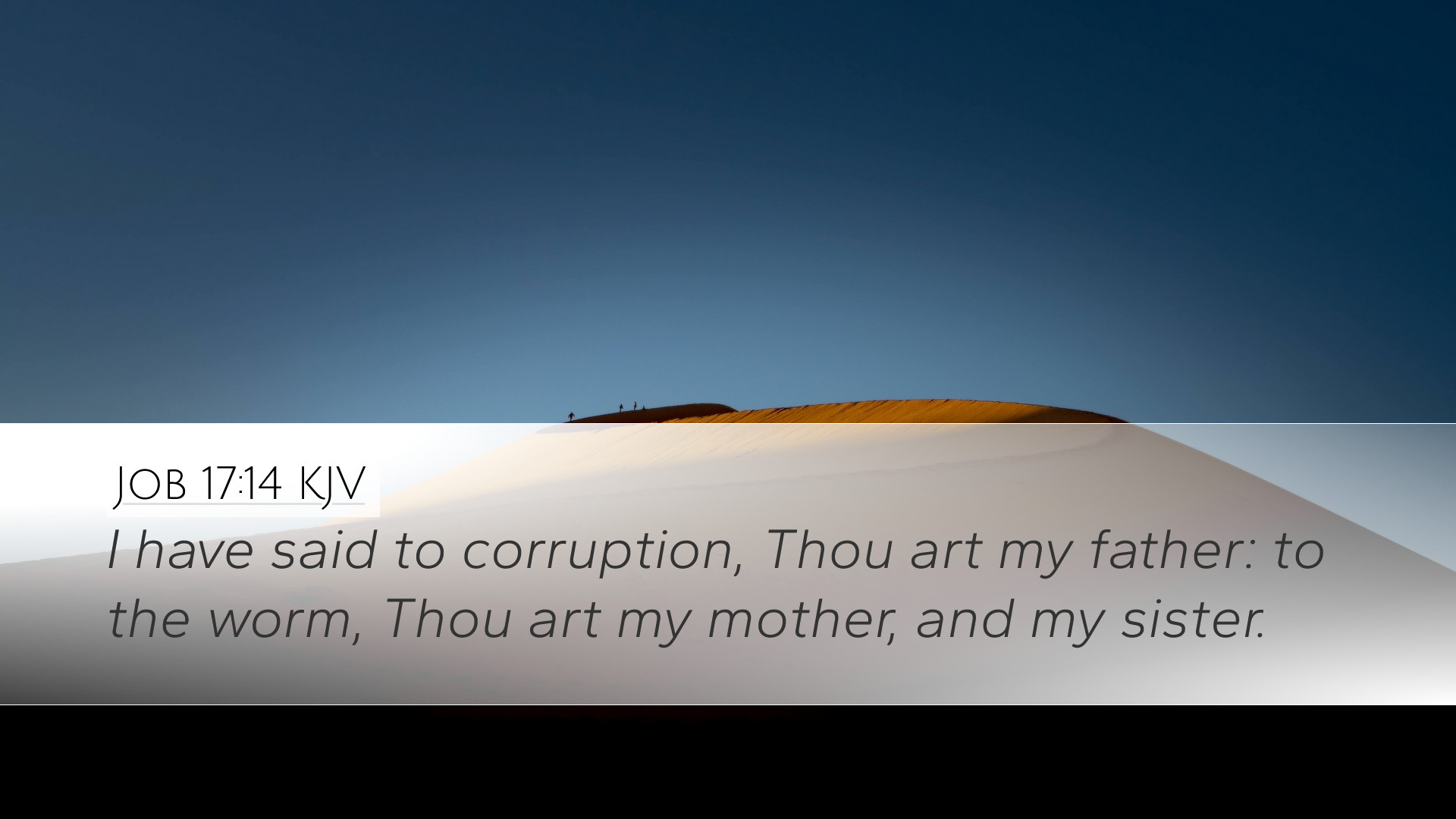Old Testament
Genesis Exodus Leviticus Numbers Deuteronomy Joshua Judges Ruth 1 Samuel 2 Samuel 1 Kings 2 Kings 1 Chronicles 2 Chronicles Ezra Nehemiah Esther Job Psalms Proverbs Ecclesiastes Song of Solomon Isaiah Jeremiah Lamentations Ezekiel Daniel Hosea Joel Amos Obadiah Jonah Micah Nahum Habakkuk Zephaniah Haggai Zechariah MalachiJob 17:14
Job 17:14 KJV
I have said to corruption, Thou art my father: to the worm, Thou art my mother, and my sister.
Job 17:14 Bible Commentary
Commentary on Job 17:14
Verse Text: "If I say to corruption, Thou art my father; and to the worm, Thou art my mother, and my sister;" (Job 17:14, KJV)
Introduction
The book of Job delves deep into the themes of suffering, faith, and divine justice. In Job 17:14, Job expresses his deep despair and confrontation with mortality. This commentary combines insights from prominent public domain scholars such as Matthew Henry, Adam Clarke, and Albert Barnes, offering a comprehensive exploration of the verse.
Contextual Analysis
Job, a man of great integrity and faithfulness, experiences unprecedented suffering. This verse emerges during a moment where Job grapples with the reality of death and decay. Understanding the context is crucial; Job is not merely speaking about physical death but engaging in a profound dialogue about the nature of his existence amidst his trials.
Exegesis of Job 17:14
In this verse, Job metaphorically describes death and decay in familial terms, addressing "corruption" as a father and "the worm" as a mother or sister. This grim imagery reflects his overwhelming despair and awareness of his own mortality.
Job's Despair
Matthew Henry's Perspective: Matthew Henry interprets Job’s declaration as an expression of hopelessness. He indicates that Job acknowledges the certainty of death, viewing it as inevitable. Henry notes that Job's comparison to family members illustrates the intimate relationship he feels toward death and decay. It suggests an acceptance of his fate rather than a rejection.
Adam Clarke's Insight: Clarke highlights the personal nature of this statement, emphasizing that Job’s figurative language enhances the depth of his suffering. By identifying corruption and worms as family, Job reflects his feeling of abandonment, being forsaken by friends and even God. It represents a tragedy of isolation in his darkest hour.
Spiritual Implications
Albert Barnes' Interpretation: Barnes emphasizes that Job’s words reflect a profound theological reality—that life is fleeting and that death is a unifying thread in human experience. He points out that Job's extreme statement might serve as a moment of catharsis, allowing for a confrontation with the ultimate questions about life, death, and divine sovereignty.
Job’s articulation of death as a familial entity can be seen as a way for him to grapple with and understand his suffering better. There is an acknowledgment here that to confront decay is to confront the essence of life itself.
Theological Reflections
This verse opens avenues for discussions concerning theodicy—the justification of God's goodness given human suffering. Job’s raw honesty reflects a struggle familiar to many believers navigating faith in the face of inexplicable suffering.
Human Mortality and Divine Sovereignty
- Mortality's Certainty: Job's realization about his mortality serves as a reminder of the human condition. As Clarke observes, the painful truths of our existence must be acknowledged if we are ever to move beyond them.
- Confrontation with Suffering: The stark imagery Job employs emphasizes the importance of confronting our suffering. To name corruption and decay as family signifies an intention to come to terms with these realities rather than ignore them.
- The Role of Faith: Despite Job's turmoil, his continual dialogue with God suggests a deeper faith. His honesty can inspire both pastors and students to embrace vulnerability in their own struggles.
Pastoral Applications
Job 17:14 offers rich material for pastoral counseling. In the face of suffering, individuals often grapple with similar feelings of loneliness and despair. Job’s expression invites us to explore these feelings openly in community.
Encouragement in Suffering
- As pastors, understanding the depths of suffering allows for empathy and support for those mourning, mirroring Job’s lament and encouraging a safe space for processing grief.
- Highlighting the importance of naming our struggles can lead to healing. Job's language can serve as a model for believers who are reluctant to confront their pain directly.
- Teaching the importance of lament in Christian life can foster an environment where believers feel free to express their emotions authentically, much like Job did.
Conclusion
In Job 17:14, we encounter a profound declaration that resonates through ages—a testament to the human condition intertwined with faith. The echoes of Job's words reflect truths about suffering, mortality, and a longing for understanding. Through the collective insights presented by prominent biblical commentators, we see that this verse not only sheds light on Job's experiences but also serves as a mirror reflecting our own struggles with suffering and faith.
This commentary aims to encourage deeper reflection among pastors, students, and scholars, inviting them to engage with the complexities of grief and the assurance of God's presence even in seemingly desolate circumstances.


